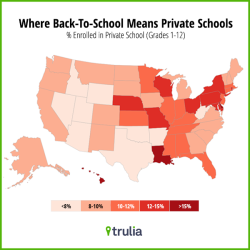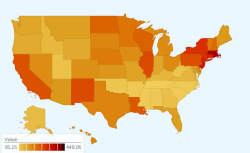Blog Archives
Hillary Kelly takes issue with suburbanites claiming the city as their own:
These hometown fabulists—let’s call them Faux Urbanites—defend themselves by claiming it’s easier to name the nearest big city as your hometown than to explain where exactly Strasburg, Colorado, is. Recently, an article in The Atlantic’s CityLab backed up that very argument, saying, “At simplest, it’s a matter of convenience; it can indeed be easier, and faster, to tell someone whom you assume does not know the intricacies of New England that you’re from Boston, when in fact you’re from Cumberland, Maine.” But it really isn’t that taxing to add a few short words that properly explain a town’s location. It’s just four short syllabic steps from “I’m from Los Angeles” to “I’m from a suburb of Los Angeles.” And from there, it’s just a few more words of explanation to start coloring in the details of your upbringing.
Freddie deBoer and Alan Jacobs take issue with this. Both accuse her mostly of posturing. But if one is proud of where they come from, I can see why they might be frustrated by people on the outside of it claiming the same.
 The problem is that “inside” and “outside” really are not rigidly defined. Multiple people in Freddie’s commenters pointed out that Philadelphia in particular is a bad example, because many people who live in Philly proper actually live in what would be the suburbs in some other city. Colosse has little townlets right near downtown Colosse, and you can be fifteen miles away from downtown and still be in Colosse proper.
The problem is that “inside” and “outside” really are not rigidly defined. Multiple people in Freddie’s commenters pointed out that Philadelphia in particular is a bad example, because many people who live in Philly proper actually live in what would be the suburbs in some other city. Colosse has little townlets right near downtown Colosse, and you can be fifteen miles away from downtown and still be in Colosse proper.
Mostly, though, the cities are organisms much larger than their flagship. Philadelphia wouldn’t be what it is without its suburbs. Those cool things that exist downtown? A lot of them exists due to a customer base that extends into New Jersey and elsewhere. Without the suburbs, Philadelphia has roughly the population of Raleigh-Durham or Virginia Beach. And Philadelphia has wide city limits and is the fifth largest municipality in the country, so it’s not even a suburb-heavy place like Seattle. People in the city talk about how the suburbanites need the urban core for jobs, but urban employers rely on an employee pool that leans heavily on the suburbs. And suburban employers rely on commuters from the city and other suburbs, and on and on.
 I used to actually say “I am from Mayne” or “I am from Southfield” or “I am from half way between Colosse and Surfenberg.” But then I attended Southern Tech. I got jobs inside and outside the city limits, I lived inside and outside city limits, and the longer you are in a place, the more it genuinely blends together. Which is why New Jersey’s football teams are called New York and Santa Clara is about to get a football team that’s going to keep the San Francisco name. And why I really don’t consider it remotely dishonest to say “I was raised in Colosse.”
I used to actually say “I am from Mayne” or “I am from Southfield” or “I am from half way between Colosse and Surfenberg.” But then I attended Southern Tech. I got jobs inside and outside the city limits, I lived inside and outside city limits, and the longer you are in a place, the more it genuinely blends together. Which is why New Jersey’s football teams are called New York and Santa Clara is about to get a football team that’s going to keep the San Francisco name. And why I really don’t consider it remotely dishonest to say “I was raised in Colosse.”

The crimeless, jobful, and not-quite-but-a-little Randian utopia of Svalbard (above).
Rail boosters point to this, which says that over half of train riders did not have a car to make the trip. Important to know. Also important to know – as we figure out where we should put our transit dollars – the same is true of three-quarters of bus riders.
It’s often assumed that one of the reasons that health care costs are as high as they are is because we incentivize more – rather than better – care in how we compensate doctors. An experiment with pharmaceuticals demonstrates that it’s more complicated than that.
Dubai is building a temperature-controlled city.
Australia is often torn between the costs and benefits between a good relationship with the US and a good one with China. China is, apparently, making their choice easier.
We’re going to start giving planets cooler names.
Population growth is stressing Seattle’s sushi.
The vigor and frailty of the California economy.
Whether he intends to or not, Mike Rowe seems on his way to becoming a Republican icon.
After spending so much effort and money trying to get people to drive low-mileage cars, it is rather humorous to change tax laws to make sure that they – who did what everyone was implored to do – pay more taxes and fees.
Once upon a time, there was a brave soul who stood up to popular opinion in order to do the right thing. His name was George W. Bush, and he was outvoted 29-to-1.
HSR booster James Fallows gives space for the arguments against high speed rail. Uncle Steve actually has one of the better counterarguments, which is that HSR isn’t supposed to help Central Valley as much as allow urbanites to more easily avoid it.
Dmiti Mehlhorn argues that progressives shouldn’t support public workers unions anymore. More from David Schuler.
Maybe we kind of want our surgeons to be… the way that stereotypical surgeons are.
China thinks they could take us in a war. David Axe argues that they’re overlooking something significant: our undersea fleet.
It’s kind of weird to see this song in a Disney channel context with dancing clowns. For those of you unfamiliar with the song, or who have never really listened to it, it’s actually kind of on the dark side.
The basic story of the song is that a girl was entranced by the circus that came to town. She “took up” with some clown and thought she had found a different sort of love that was fake. When the circus left town, she her broken dreams were left among the litter. The title of the song is “Don’t Cry Out Loud”… not as in don’t cry, but keep it to yourself and try to be strong in a world of heartbreak.
Somebody had the idea of putting some dancing clowns and putting it on the Disney Channel.
In a way, I approve.
-{Editor’s note: I have decided to discontinue the “Hit Coffee Weekend” feature in favor of posts like this, where I find something to talk about in the video.}-
Recently, advocates for the poor have been up and arms about so called “poor doors” in New York City:
A plan for a luxury skyscraper with a so-called “poor door” is changing to extend more of a welcome to residents of its cluster of affordable apartments, officials and the developers said Friday.
The retooled plan for 1 West End Ave. still involves separate entrances, but all residents will now have access to such building amenities as a courtyard and river-view roof deck, and the affordable segment’s lobby will be stylishly appointed and set facing a park.
The retooling follows an outcry over developments that got government incentives to include affordable housing but have separate amenities and even entrances for higher-paying residents. Developers say such arrangements can help make it financially feasible to build affordable housing at pricey addresses.
I consider the underlying policy here to be quite dubious. Developers of luxury skyscrapers are – in exchange for being able to build them – required to also build many heavily subsidized where the inhabitants are selected by lottery. There are some questions about whether the lottery itself is rigged, but let’s assume for a moment that it is not. Given that there is an unavoidable scarcity and that there is no possibility of the demand ever being met (in NYC, anyway), this mostly strikes me as a feel good solution that helps a few winners.
It’s understandable to me, then, that the developers would find some way to make the distinction between those who are actually paying for their apartment and others that won the lottery and are having subsidies in the tens of thousands of dollars. I have in the past expressed support for landlords being able to discriminate against rent controlled tenants.
And yet here, I actually side with the critics.
With the rent controlled tenants, the apartment owners had a strong case that if they couldn’t raise rents to pay for it, they had little motivation to add new amenities. So limiting access to the laundry room to those tenants who started leasing apartments at or after the time they were built, makes sense to me. There were other things they tried to do that I couldn’t support, but I was on board with some of it.
Here, though, it is in pretty direct circumvention of a policy that, while I don’t support, has a rationale that is built around putting wealthy and non-wealthy people together. It is very much geared towards making the lottery winners full inhabitants of the apartment building, and that was what the developers signed on to when they agreed to build under the contract signed.
With the rent control, a lack of reinvestment in properties where prices are stuck struck me as a reasonable threat. Here, I don’t see what the public policy threat is to allowing the lottery winners access to the same doors as everyone else. I understand what the apartment building gets out of it, and what the full-freight tenants get, but neither of those are of public policy concern, as far as I can see. The full-freighters aren’t going to refuse to rent affected apartments. The developers probably aren’t going to refuse to seek the permits. If this actually would be a dealbreaker for too many developers, then I’d reconsider. I’m just not seeing it.
To answer Lion’s question, “Why is someone paying $1000/month entitled to the same grand entrance as someone paying $10,000/month?” the answer is that it circumvents a part of the intent of the policy.
While I am not in favor of the underlying policy, if it’s going to be policy it should be pursued unless a good reason to change course is presented. “I don’t want to share a door with poor people” isn’t a good reason.
Addendum:
Looks like this may really be a non-issue. According to the Washington Post:
Take, for instance, Portner Place, a complex of garden-style Section 8 apartments near the popular intersection of U and 14th streets in Northwest Washington, D.C. The land is slated for redevelopment into a roughly 350-unit mixed-income property that will include two wings: one for market-rate professionals eager to live near the U Street scene, and the other for Portner Place’s existing residents, plus another 48 units of affordable housing meant for households making less than 60 percent of the area median income. The wings will have separate entrances, off separate streets.
Portner Place’s current tenants requested this.
If that’s what the residents on both sides of the divide want, I’m certainly disinclined to object.
 Uber drivers are protesting outside company headquarters. Maybe they should unionize. Or demand a medallion system.
Uber drivers are protesting outside company headquarters. Maybe they should unionize. Or demand a medallion system.
A lot of patient care isn’t as exciting or mysterious as it is on TV.
Contraception at the push of a button.
Rachel M Cohen argues that we may have a right to free parking.
Walter Frick argues that patents are stifling innovation and Vox lays out the case against software patents. JVL chimes in with Patent Trolling for Dollars.
Know what Detroit needs? Detroit needs goats.
I previously mentioned a mammoth waterslide in Kansas City. Here’s a video. And here’s a scary ride in Denmark.
Boom California looks at San Fransisco’s housing crunch, and by way of explaining it convinced me that whatever SF’s faults, the blame lies more with its neighbors. Like Palo Alto and its zero growth vision.
In marriage, men see trouble with the existence of negatives, while women are more likely to notice the absence of positives.
After spending a week on the cell phone to end all cell phones in 2004, Ashley Feinberg reports that it actually kind of sucks. Good battery life, though.
According to the WSJ, there’s a labor shortage in long-range trucking, and economic mobility is alive and well for those who get vocational training.
Curiously, even as more and more people are out of work, it’s taking employers longer and longer to fill vacancies.
Even Alyssa Rosenberg is disturbed by the blurring of art criticism and political criticism, and that’s her job!
One of those subjects that leaves me entirely clueless on ethics and morality… making contact with isolated tribes like those in Brazil.
Earth’s magnetic field is weakening.
It is estimated by some that one in ten father-child relationships are a result of false paternity. That, it turns out, is likely bunk.
Matt K Lewis makes the conservative case for new urbanism.
Is it me, or does this guy look kind of like the geeky brother from Numb3rs?
 To the right: What an interplanetary Pangaea might look like.
To the right: What an interplanetary Pangaea might look like.
James Fallows chats with a space entrepreneur about colonizing Mars. James McGirk says we should look at floating cities above Venus.
If we do decide to colonize Mars, we may have figured out how to do space farms. {More}
Mental Floss asks “When did Americans lose their British accents?” Relatedly, I don’t like superfluous ‘u’s, but it sure would be simpler if we’d never deviated from British spelling.
A police officer in Houston was pulled over and noticed something funny about the ticket he was given. A scam and a scandal was unraveled.
The Internet filter of a school district in Connecticut decided to start blocking conservative websites. Obviously, this is an issue of funding and if we gave the Internet filterers more of it, they would not have to gang up only on conservative websites…
I’m pretty bummed about what it’s looking like the government is about to do to Voice of America.
China is conglomerating a city that will have a population of 130,000,000 people.
Embarrassing (and funny) of comments the Chinese have made unaware that the person they are talking to speaks Chinese.
Antarctica inhabits an odd place in the nation-state dynamic, perhaps making us rethink sovereignty. More on Antarctica.
Fanisha Fazal and Ryan Griffiths ask why secession is becoming so popular. Open Democracy attributes it to increasing internationalism.
Another ineffective weight-loss strategy: “Eat more fruits and vegetables.”
Nick Hanauer argued that wealth inequality was going to lead to pitchforks on the richers front lawns. John Aziz says that our institutions aren’t sufficiently corrupt.
When I did my Links Across America thing on July Fourth, I really should have had an entry for Denmark. Also, a 1988 TNR piece on the international reaction to the American Revolution.
Perhaps touching the Ark of the Covenant got Uzzah electrocuted.
 Finally! The map I have long wanted to see: Which states send kids to private schools in large numbers.
Finally! The map I have long wanted to see: Which states send kids to private schools in large numbers.
It’s one of those obvious statistics that should have been easily accessible, but I’ve never had luck in finding it. I found the results corresponded with my biases pretty, though with some exceptions:
- I’m not surprised that it’s most prevalent in the northeast (broadly defined), though I would have expected it to go further east into Massachusetts and Connecticut and wouldn’t have figured that it would count Ohio. I suppose with Massachusetts having one of the best school systems in the country, it’s not particularly necessary. Perhaps also, Massachusetts sending many of its best and brightest to public schools may help keep it on the top of public schooling lists. Then again, Maryland has good schools and still a lot of people going to private schools.
- Less common in the South, excepting Louisiana. The Pelican State has a robust Catholic schools. I didn’t particularly expect Mississippi and Alabama to be outliers, and if guessing would have guessed that they’d have lower numbers than Dixie’s eastern seaboard.
- I would have been surprised by Wisconsin, though that came up during the recall elections and whatnot, that private schools were more common there. I’m not sure why.
- By far, the most surprising state was Nebraska. Really, I would have figured that the central column of states would be relatively similar. Instead Texas and the Dakotas are low, but the others are high. While Nebraska is the biggest surprise, I wouldn’t have expected Kansas or Missouri, either.
- It’s interesting, if not surprising, that both Utah and Idaho have such low rates. One can imagine an alternate history where the LDS has its own school system the way that Catholics have theirs. Instead, with the degree of social domination they have over Utah and eastern idaho, I suppose they had their Mormon schools in the public school system and having private Mormon schools would have been a duplication of effort.
- Hawaii. Huh. I’m not surprised, because I wouldn’t have hazarded a guess. But it does kind of stand out.
- There is less variation between the states than I would have guessed. You have some below the 8% cutoff so they could have next to none. There aren’t many at the higher end, though, and that surprised me a little bit. Off the deep end, though, it’s just Louisiana, Delaware, and Hawaii.

- Since Catholicism likely affects the rates, I am including a map with that data point to compare and contrast. Obviously, this is likely to be more pertinent in some places than others. For example, the higher rates in California are due no doubt to the higher Hispanic population, which may not track with private school attendance the same way that it would in Louisiana. It does a good job of explaining Louisiana, for example, and Rhode Island. Less so for the Hispanic states, and you would think that it would lead to higher rates than Massachusetts.
As Hit Coffee readers know, I am famously against nail polish. And yet, I have recently run across a type of nail polish that I approve of:
It’s a nail polish that doubles as a way to thwart sexual assault – and it’s being developed at N.C. State University: Undercover Colors.
The chemistry startup, developed by undergrads, is creating a nail polish that, when exposed to date rape drugs, changes color.
The nail polish is a scientific attempt to thwart a nationwide problem. A recent Washington Post analysis showed more than 3,900 allegations of forcible sex offenses on college campuses nationwide in 2012, a statistic that rose 50 percent in three years. Fourteen such offenses were reported at N.C. State between 2010 and 2012. During that same time period, 30 were alleged at Duke University and 52 at UNC-Chapel Hill.
Maybe, better yet, they can have one that’s clear that only colorizes when exposed to the chemicals! But even subtracting that, it’s a pretty great idea. Even if Mark Cuban also thinks so.
Charles Hill points out that it doesn’t work with other drugs, like strawberry daiquiries.
 T-Mobile has historically been one of the few “good guys” in the cell carrier world, but they’re losing that reputation.
T-Mobile has historically been one of the few “good guys” in the cell carrier world, but they’re losing that reputation.
Employee loyalty isn’t just unrewarded, it’s actively penalized.
In a world where computers are better drivers and legal scholars than people, at what point do people become economically useless?
Tom Chiarella decided that he wanted to to, at age forty-six, take up smoking. Not liking it, he nonetheless persisted.
First they came for the Redskins. Then, the Cougars! Back when I was in middle school, another middle school opened up and the kids overwhelmingly wanted “Cobras” to be their mascot. It was shot down because admin assumed that it must be a gang thing.
Titan has a mysterious object on it, and an atmosphere older than Saturn’s.
Roy Peter Clark takes an aggressive stand for the passive voice. Like the double-negative, this is one of those things I was taught was wrong that was only wrong in certain (though common) circumstances.
Japan is building roads in poor countries, hoping to bolster their own economy by helping get economies around them moving.
How Japan is rebuilding old Tokyo, away from crowded density and towards higher density.
In Iceland, you can’t name your daughter Harriet (or any other name that’s not on a list). Though I am against such things, for reasons freedom-loving and logistical, when I was substitute teaching there were times when I wished parents had less freedom and a list from which to choose.
America’s fastest growing metro has no crime, kids, or cars.
Over twenty years later, Batman The Animated Series remains an animation marvel and will doubtlessly be remembered long after its successors The Batman and Beware the Batman.
Alexis Madrigal takes aim at sitcoms’ doofus dads. This is one of the areas that both sides feel put upon. Men because they believe it makes them look bad, women because they believe it increases their sphere of responsibility.
Jim Russell declares The Death of Urbanization in the United States. He over-states his case as domestic migration is only part of the picture. Even so, it quite pointedly challenges “The Great Inversion” narrative and perhaps suggests a different fate for rural America than we might assume.
Mauricio Estrella used computer passwords to change his life.
In 1995, Eugene Volokh (of Conspiracy fame) made a number of predictions about the media and technology, much of which turned out to be on the money. More good predictions.

